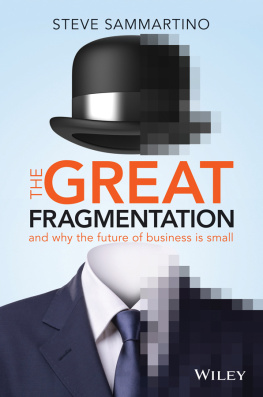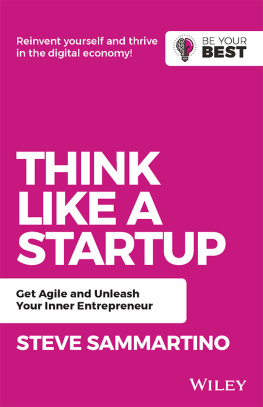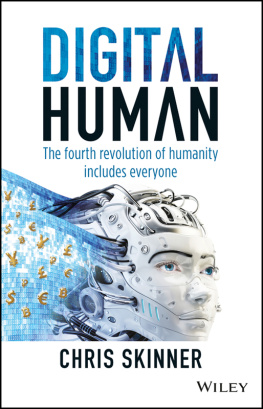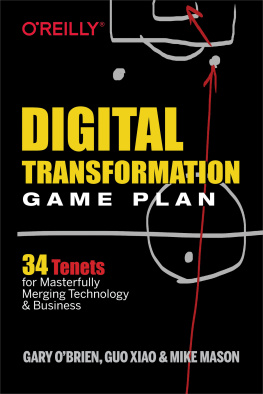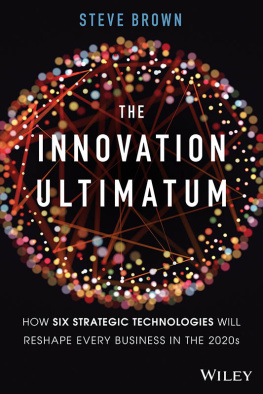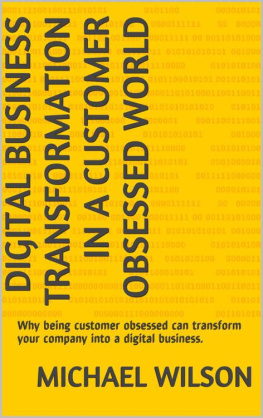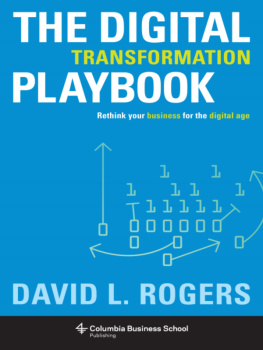
First published in 2014 by John Wiley & Sons Australia, Ltd
42 McDougall St, Milton Qld 4064
Office also in Melbourne
Steve Sammartino 2014
The moral rights of the author have been asserted
National Library of Australia Cataloguing-in-Publication data:
| Author: | Sammartino, Steve, author. |
| Title: | The Great Fragmentation : why the future of business is small / Steve Sammartino. |
| ISBN: | 9780730312680 (pbk) |
| 9780730312703 (ebook) |
| Notes: | Includes index. |
| Subjects: | Business enterprises. |
| Information technology. |
| Information society. |
| Dewey Number: | 658.4062 |
All rights reserved. Except as permitted under the Australian Copyright Act 1968 (for example, a fair dealing for the purposes of study, research, criticism or review), no part of this book may be reproduced, stored in a retrieval system, communicated or transmitted in any form or by any means without prior written permission. All inquiries should be made to the publisher at the address above.
Cover design by Wiley
Cover image iStock.com/ pavlen
Disclaimer
The material in this publication is of the nature of general comment only, and neither purports nor intends to be advice. Readers should not act on the basis of any matter in this publication without considering (and if appropriate, taking) professional advice with due regard to their own particular circumstances. The author and publisher expressly disclaim all and any liability to any person, whether a purchaser of this publication or not, in respect of anything and of the consequences of anything done or omitted to be done by any such person in reliance, whether whole or partial, upon the whole or any part of the contents of this publication.
ABOUT THE AUTHOR
Steve Sammartino had his first startup before the age of 10, running an organic egg farm in the early 1980's before the words organic or startup had been invented. The first phase of his adult' career was in marketing, working his way into senior executive roles in global consumer goods companies and advertising agencies. He escaped his cubicle for the first time in 2005 and went on to found rentoid.com a peer-to-peer renting portal that became a leader in the collaborative consumption movement. After a successful exit he embarked on a number of crazy side projects including putting a Lego space shuttle into actual orbit, building a jet-powered bicycle, and crowdfunding the build of a full-size Lego car that runs on air and uses an engine made of Lego all to prove what's possible in a connected world with low cost technology.
He does some serious stuff too.
Steve also travels the world helping companies transition from industrial-era thinking into the digital age, writes on business and technology issues and blogs to over 30 000 readers a month.
His latest startup project is Tomcar Australia a seven-person car company which makes and sells all-terrain vehicles. It is Australia's first car startup in over 30 years and a company that practises what Steve preaches.
Connect with Steve, check out his latest projects or read his blog via www.stevesammartino.com.
Or maybe just say hi to @sammartino on Twitter.
PREFACE
Over the past 10 years I've been a keen observer of the business landscape. I had an inkling something was going on when I left corporate life for the first time in 2005. It was a time when the web 2.0 era was gathering a head of steam. A real sense of empowerment was sweeping the entrepreneurial community. Many of the tools of business were all of a sudden becoming accessible and easier to use. You didn't need anyone's help to find out how to do something because information was entering the on-demand' realm. While most of us still had VCRs in our houses with the time blinking on 12 am, some savvy tech geeks decided to refocus their efforts externally. They decided to not just build something for themselves, but to build something for all of us something end users could play with, improve upon and even use to build something else. The insight of creating for further creation and humanising and socialising business was inspired.
This was a bit unexpected because after the dotcom crash a lot of us (me included) had doubts about the technology utopia the internet promised to provide. But, while it was delayed, it has arrived. What's arrived has turned out to be far more widespread and structural than most people predicted. It turns out that information that's freed up and accessible by all has an equal and opposite impact on the physical world. Information becomes objects. Information changes the shape of the physical world. Information changes the social and physical world and inevitably the economic structure.
In many ways, it's the opposite of what business had been about up until this point. Business was a zero sum game of producers and consumers: an us' and them'; a server-and-receiver structure. But most of all, it was a definitive power structure where the people who already had wealth and access had much of the economic power. And I know what you're about to say: But what about the 1 per cent, the ever-increasing wealth of the wealthiest few?' The truth is that we're just at the start of a bigger revolution where everything important in life and business is becoming cheaper and more available to everyone. It's a time when our standards of living will increase exponentially via the dissemination of powerful technology; a time when the power flips back to the populous as tools of all sorts are democratised. It will be an entire revision of the factors of production, the way business is done and the power structures around our economy.
As this book is written at the intersection of technology and business, there will be concepts that may not be from the business world you live in. The good news is that the definition of much of the new terminology is provided in the book and the rest is a mere web search away from a quick definition. Let your curiosity take you away from the book and on a non-linear journey something that matches life. It's also worth remembering that what matters is not so much how any of this technology works, but how it reconfigures commerce. It's the patterns that matter. As business people, we only need to concern ourselves with what technology can do, not how it does it.
The main economic pattern is the increasing fragmentation of industries. Everything in business is breaking down into much smaller pieces. More access is resulting in more players and in more options being available for everything we do and make; in other words, a more decentralised economy. The delineation between makers and buyers is evaporating. We're moving into a phase of highly distributed crowd-powered business systems. The parts that make up our economy are shifting and while the final structure is not knowable, the trajectory is. We're entering a phase in business where things are moving so quickly that we need to avoid the pretence of claiming to know the outcome. Instead, what's needed is an open-source strategy that matches the technology and the newly empowered populous: a world where there are very few trade secrets.
Business is facing its own climate change, but it seems to me that much of the thought and analysis to this point has been about keeping the water out of the front door, or building a better boat to keep a business afloat. As business leaders and entrepreneurs we have to go wider. In times of significant change, what's really needed is a thorough analysis of the landscape and a topographical assessment of the new world. Even the big players the new big' became big by creating highly distributed networks of small pieces that are more loosely tied together with many more fragmented products and services. The new digital dominators all live deep inside the long tail.
Next page
